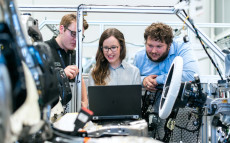- pathfindersAI
- Job Profile
Validation Engineers
Summary
Validation Engineers: A Comprehensive Career Overview
What They Do
Validation engineers are critical players in the technology and manufacturing sectors, ensuring that products meet specified regulations and quality standards before they hit the market. Their primary role is to evaluate systems, components, and products to confirm that they operate effectively and safely. These professionals commonly collaborate with design, development, and production teams to design tests and analyze data, thereby contributing to the creation of robust and reliable products.
Job Responsibilities
The responsibilities of a validation engineer are both diverse and technically demanding. Primarily, they design and implement validation protocols to verify that products operate as intended under various conditions. These protocols often involve rigorous testing schemes, including stress tests, safety checks, and performance evaluations. Furthermore, they are responsible for troubleshooting any issues that arise during the validation process and suggesting improvements. They must maintain detailed documentation for each validation phase to ensure transparency and traceability. Validation engineers frequently collaborate with regulatory bodies to ensure that the products conform to industry standards and legal requirements. Additionally, they play a pivotal role in the continuous improvement process, applying their findings to future product iterations.
Essential Skills
Validation engineers require a robust set of skills to succeed in their roles. Technical acumen, particularly in fields like mechanical, electrical, and software engineering, is indispensable. Mastery of testing methodologies and an understanding of statistical tools are critical for analyzing test data accurately. Problem-solving abilities and attention to detail enable validation engineers to identify and address issues efficiently. Strong communication skills are essential for documenting processes and collaborating with cross-functional teams. Familiarity with regulatory standards and quality assurance protocols is also vital, as these skills ensure compliance with industry regulations.
Educational Pathways
The educational journey to becoming a validation engineer typically begins with a bachelor’s degree in engineering, such as mechanical, electrical, or software engineering. Some positions may require further specialization or a master’s degree, particularly in fields like quality assurance or regulatory science. Coursework in subjects such as statistics, physics, and computer science can provide a solid foundation for the technical aspects of the role. Internships and cooperative education programs offer valuable hands-on experience, while professional certifications in quality assurance (like CQE or Six Sigma) can enhance a candidate's credentials.
Career Prospects
The career prospects for validation engineers are promising, driven by the increasing complexity of products and the stringent quality standards across diverse industries. Opportunities abound in sectors such as pharmaceuticals, aerospace, automotive, and consumer electronics, where rigorous validation processes are essential. With the rise of technological advancements and the Internet of Things (IoT), the demand for skilled validation engineers is expected to grow. Many validation engineers start in entry-level positions and progress to roles such as senior engineers, project managers, or quality assurance directors. The combination of technical expertise and industry knowledge opens doors to a multitude of career pathways.
Conclusion
In summary, a career as a validation engineer offers a blend of technical challenges and opportunities for innovation. With a critical role in ensuring product safety and efficacy, validation engineers contribute significantly to the success of various industries. By developing essential skills and following strategic educational pathways, aspiring validation engineers can look forward to a dynamic and rewarding career. As the demand for higher quality and technologically advanced products continues to grow, the importance of this profession is set to rise, offering promising prospects for those entering the field.
Video
Compensation
| State | Median Salary | Median Hourly | Positions |
|---|---|---|---|
| AL | 97,360 | 46.81 | 7,440 |
| AZ | 104,210 | 50.10 | 7,100 |
| AR | 93,220 | 44.82 | 1,850 |
| CA | 111,770 | 53.74 | 24,640 |
| CO | 102,150 | 49.11 | 5,230 |
| CT | 99,420 | 47.80 | 6,190 |
| DE | 114,250 | 54.93 | 800 |
| DC | 102,210 | 49.14 | 170 |
| FL | 100,010 | 48.08 | 13,130 |
| GA | 95,930 | 46.12 | 7,440 |
| HI | 113,350 | 54.50 | 40 |
| ID | 105,760 | 50.85 | 1,770 |
| IL | 99,660 | 47.91 | 17,760 |
| IN | 88,360 | 42.48 | 10,910 |
| IA | 97,290 | 46.78 | 4,610 |
| KS | 93,560 | 44.98 | 3,370 |
| KY | 84,980 | 40.86 | 6,020 |
| LA | 125,830 | 60.49 | 2,020 |
| ME | 98,100 | 47.16 | 750 |
| MD | 107,260 | 51.57 | 2,910 |
| MA | 104,120 | 50.06 | 11,370 |
| MI | 98,340 | 47.28 | 27,470 |
| MN | 99,630 | 47.90 | 18,760 |
| MS | 85,540 | 41.13 | 1,990 |
| MO | 92,120 | 44.29 | 5,390 |
| MT | 101,580 | 48.84 | 480 |
| NE | 86,790 | 41.73 | 1,520 |
| NV | 108,380 | 52.11 | 980 |
| NH | 99,780 | 47.97 | 1,720 |
| NJ | 101,410 | 48.76 | 6,910 |
| NM | 107,710 | 51.79 | 800 |
| NY | 99,110 | 47.65 | 12,330 |
| NC | 94,040 | 45.21 | 10,200 |
| ND | 79,720 | 38.33 | 550 |
| OH | 96,500 | 46.40 | 19,230 |
| OK | 95,090 | 45.72 | 2,340 |
| OR | 103,080 | 49.56 | 4,060 |
| PA | 84,530 | 40.64 | 13,310 |
| RI | 105,410 | 50.68 | 1,000 |
| SC | 92,470 | 44.46 | 7,070 |
| SD | 87,210 | 41.93 | 870 |
| TN | 92,830 | 44.63 | 6,710 |
| TX | 102,020 | 49.05 | 24,390 |
| UT | 102,770 | 49.41 | 4,310 |
| VT | 98,660 | 47.43 | 500 |
| VA | 98,600 | 47.40 | 5,120 |
| WA | 105,130 | 50.54 | 5,820 |
| WV | 100,230 | 48.19 | 830 |
| WI | 81,750 | 39.31 | 12,270 |
| WY | 124,910 | 60.05 | 240 |
Similar Occupations
In this area you will find other occupations that are close to the one you were viewing in tasks, knowledge and work environment. If the primary job profile you are viewing isn't quite to your liking, take a look around and see what else is available.
Basic and Premium Accounts have more alternative occupations available than the Free account.

Automotive Engineers - 17-2141.02
Automotive Engineers design, develop, and improve vehicles and their subsystems, ensuring they meet performance, safety, and efficiency standards. They work on tasks ranging from creating prototypes to conducting rigorous testing and collaborating with multidisciplinary teams to bring innovative automotive solutions to market.
-
$99,510/yr
Median Pay -
281,290
Number of Jobs

Electrical Engineers - 17-2071.00
Electrical engineers design, develop, and maintain electrical systems and components to ensure their efficient and reliable operation. They work on a diverse range of technologies including power generation, electronics, telecommunications, and control systems, innovating solutions to meet both current and emerging technological needs.
-
$106,950/yr
Median Pay -
185,430
Number of Jobs